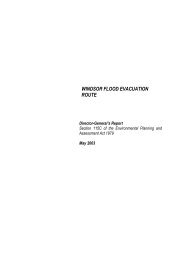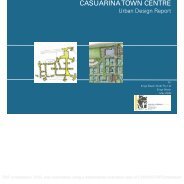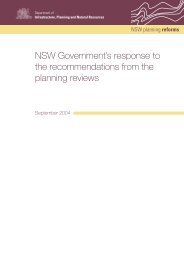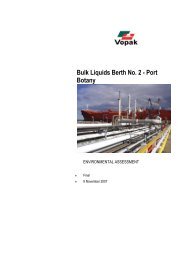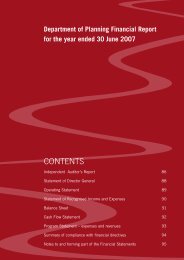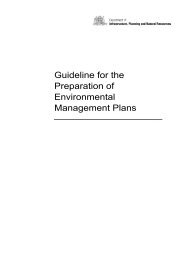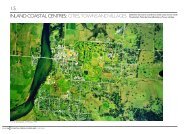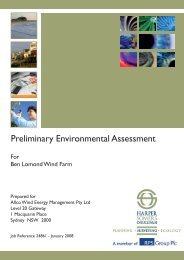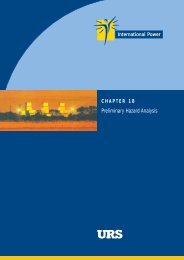Final Report PlanFirst Review Taskforce - Department of Planning
Final Report PlanFirst Review Taskforce - Department of Planning
Final Report PlanFirst Review Taskforce - Department of Planning
You also want an ePaper? Increase the reach of your titles
YUMPU automatically turns print PDFs into web optimized ePapers that Google loves.
When preparing new integrated plans in advance <strong>of</strong> regional strategy development, councils need<br />
to collaborate with State agencies to ensure that the full range <strong>of</strong> State issues is considered. Any<br />
emerging regional issues will need to be incorporated within the strategic component <strong>of</strong> the<br />
integrated plan to ensure consistency with regional objectives is achieved.<br />
In addition to the above, the non-statutory components <strong>of</strong> an integrated plan must be adopted by<br />
councils before 31 December 2008 and all new integrated plans must be provided in an electronic<br />
format in every LGA.<br />
In order to ensure the effective delivery <strong>of</strong> integrated plans in the timeframes stipulated above,<br />
DIPNR must further develop its e-planning provisions to enable detailed property/planning<br />
information to become available over the internet.<br />
Strategic Framework for Integrated Plans<br />
The success <strong>of</strong> integrated plans depends on councils developing informed strategic positions in<br />
regard to a range <strong>of</strong> environmental planning, social, economic, natural resource and other policy<br />
issues.<br />
The development <strong>of</strong> a long term (20 year) strategic plan by local councils is necessary to guide the<br />
preparation <strong>of</strong> shorter-term strategies, integrated plans and operational plans in each LGA. Whilst<br />
the Local Government Act 1993 and the <strong>Department</strong> <strong>of</strong> Local Government (DLG) provides<br />
guidelines for councils to prepare management plans (Management <strong>Planning</strong> for NSW Guidelines,<br />
February 2000), it does not specifically require councils to prepare a long term whole <strong>of</strong> LGA<br />
strategic plan.<br />
The content <strong>of</strong> such a strategic plan should be arranged around the council’s key program areas<br />
and should address matters such as the regional context, sustainability indicators (economic,<br />
social/cultural and environmental) and supporting infrastructure. There should be clear links<br />
between the council’s long term strategic plan, its management plan, its integrated plan and its<br />
range <strong>of</strong> operational plans.<br />
In this regard, the <strong>Taskforce</strong> recommends that the Minister for Local Government should be<br />
requested to:<br />
(a) encourage councils to prepare a long term strategic plan for a sustainable future for<br />
every LGA; and<br />
(b) develop a set <strong>of</strong> ‘Best Practice Guidelines’ (following consultation with local government)<br />
for the preparation <strong>of</strong> local government management plans and strategic plans, to<br />
ensure that councils provide clear links between the management plan and the council’s<br />
strategic plan.<br />
In order to ensure the effective development <strong>of</strong> councils’ strategic plans, the DLG and DIPNR<br />
should consult with local councils during development <strong>of</strong> the best practice guidelines. This<br />
consultation should occur immediately and the DLG and DIPNR should be required to complete the<br />
guidelines before 31 March 2004.<br />
It is noted that many <strong>of</strong> the stakeholders have raised concern with the <strong>Taskforce</strong> regarding the lack<br />
<strong>of</strong> skilled town planners within local government. The town planning pr<strong>of</strong>ession, especially within<br />
local government, is recognised to be suffering from a lack <strong>of</strong> experienced planners to undertake<br />
both strategic environmental planning and development control activities. Anecdotal evidence<br />
suggests that planners are leaving local government to pursue work in the private sector or within<br />
PRINT VERSION<br />
1 September 2003<br />
24




